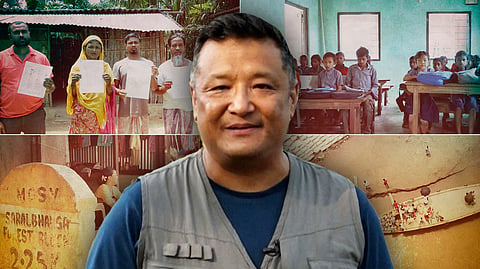

‘Who are you voting for in 2024?’
I am now in my third decade as a journalist, but even today, I cringe at asking this question. Why? Because this question seems almost intrusive. Why should a person tell me who they will vote for? And why do they need to justify their choices?
Mind you, I do understand that as journalists, we are supposed to show what the locals think, and believe and give them a chance to highlight their grievances; just that the ‘who are you voting for’ seems like the locals know who is the best choice. And if I have learnt one thing while working in the Northeast, it is that there are no direct answers to complicated questions, especially when working in areas like lower Assam. Let me explain.
At the cost of being branded the dreaded B word (which ends with a T), I will make one thing clear: the Assam of 2024 is far, far ahead of the Assam in 2014.
When I moved to Assam around seven years ago, I would rarely use binaries like “good” or “bad” when it came to roads. Assam roads were a topic of detailed discussions. Now, at least when it comes to the major roads, including highways, the answer is almost always “better”. And in areas where the highways would be categorised as “bad”, the simple answer is often ‘work in progress’. As my Kokrajhar story showed, sure, there are several regions and villages where silky smooth roads remain a dream but for now, I can definitely say that there have been marked improvements. And while the progress in the field of drinking water has not been nearly as good as roads, there too, there are positives if you go looking for them.
But elections are rarely that simple: if only all of us voted based on the work done, we, the journalists, would become an endangered species. This is why, when I visited Kokrajhar, I saw that there was more than what meets the eye. For journalists like us, Kokrajhar has always been one of those “oh, you should have seen it during the 90s/00s” place. Imagine Manipur of 2024, but only much worse and a far longer conflict. This is why witnessing discussions on startup cultures gladdened me so much; for once, I got to talk to people about something apart from politics. It was also a testament to the leadership of Pramod Boro, the young leader from UPPL who unseated Hagrama Mohilary, who, for the longest time, controlled all things political (and non-political) in Bodoland.
That said, the happiness, the joy of conversations on top-line/bottom-line and ways to fund startups, was short-lived. Kokrajhar and Dhubri are 70 km apart on the map. Realistically speaking, however, they are now decades apart.
It is impossible to shake up the feeling of doom when visiting Dhubri. Every year, the mighty Brahmaputra wipes out hectares of land and all the locals can do is move to ‘safer’ zones and, well, pray. The best way to imagine this is to think of a soap flanked by gushing water on both sides: how long do you think the soap will last? Dhubri asks the same question every year. Yes, it is important to talk about how illegal immigration is hurting Assam (and India). But I find it strange that we obsess so much with a political problem while accepting the environmental nightmare unfolding in Dhubri as an “Act of God”.
Before I started my journey, I had braced myself for encountering heart-wrenching stories of people losing all they have to prove their citizenship. In all my years working in the Northeast, this is one issue that everyone has an opinion on, but no solutions.
The BJP, the favourite party of everyone who hates immigrants based on their religion, has absolutely failed to stem the tide of illegal immigration according to locals. But I am more concerned about those who call India home. No matter what ideology you support, I am pretty sure that the sight of daily wage labourers, small shopkeepers, widows, and senior citizens losing all they own to fight legal cases is not pleasant. In Dhubri, Barpeta, and many other places, such stories are way too many to document.
In such a scenario, asking ‘who will you vote for’ felt almost like an insult. How will voting for a party change the life of a 90-year-old Samatun Bewa, who is fighting not only to prove her citizenship but also of three dead family members?
Assam 2024 is, on many parameters, doing much better than 2014. Militancy is ‘almost’ non-existent in the state, the infrastructure is in better shape, and there is hope for improvement in public health infrastructure.
But I cannot stop thinking about those who have been debarred from voting and left to fend for themselves because they live in places where being forced to relocate is not an aberration, but the norm.